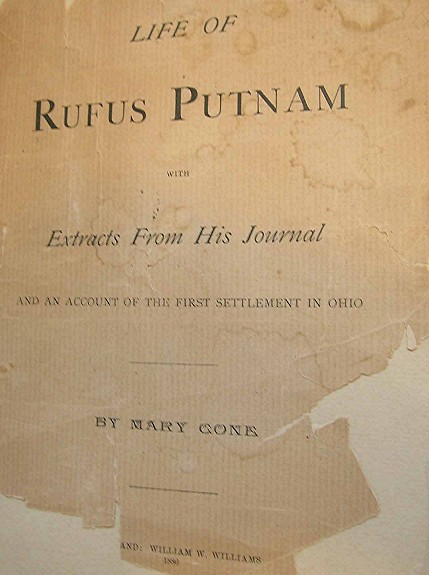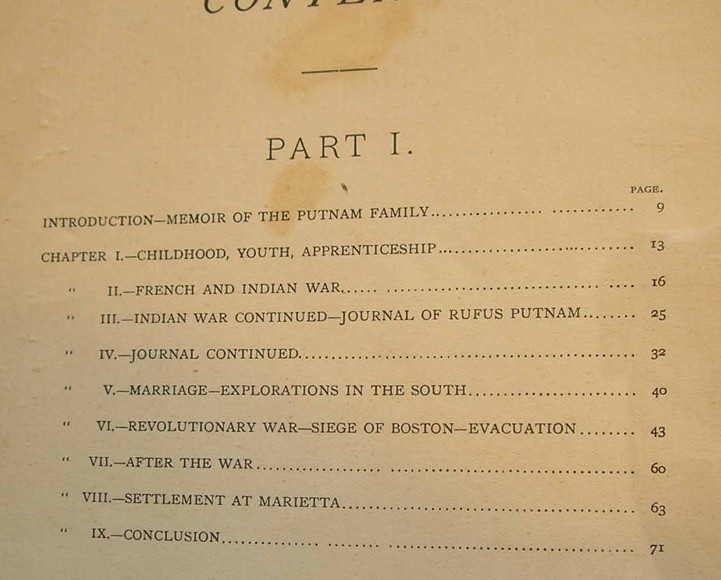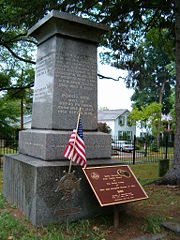PART ONE - CHAPTER I
CHILDHOOD-YOUTH-APPRENTICESHIP
As may be seen, by reference to the genealogy in the introduction, Elisha Putnam, the father of Rufus, was born in Salem, Massachusetts, November 3, 1685. He married Susannah Fuller of Danvers. In 1725 he moved, with his wife and three children, to Sutton, where he purchased a farm and continued to be a tiller of the ground, as his fathers had been before him. Three sons were born to him after his removal. Rufus, born April 9, 1738, was the youngest. The Rev. Dr. Hall said of him: "Deacon Elisha Putnam was a very useful man in the civil and ecclesiastical concerns of the place. He was for several years deacon of the church, town clerk, town treasurer, and representative in the general court or colonial assembly in Massachusetts. He died in June, 1745, in the joyful hope of the glory of God."
If Rufus was born under a propitious sky, it was clouded over before he had well begun the journey of life; for he was but little more than seven years old when his father died. To the little boy the loss of such a father was a calamity that could not be measured, and the consequences were as lasting as his life. The first two years of his orphanage were passed at the house of his maternal grandfather in Danvers. While there, he was sent to school, where he learned to read, and thus secured for himself the key to the labyrinth of knowledge. In 1747 his mother married Captain John Sadler, and Rufus went back to his home. But it was a home without a father, for Captain Sadler but illy supplied the place of the good man that death had taken away. He was illiterate himself, and what was worse and more to be deplored, he despised learning. The little boy Rufus was not only not sent to school, but, so far as his stepfather had the power, all opportunities for improvement at home were denied him. No books were furnished him, and, if by chance, he obtained them, he was allowed but scant opportunity to use them. His [14] aspirations were scoffed at, and his efforts to go to the living fountains to slake his thirst for knowledge were ridiculed and derided.
Captain Sadler kept a house of entertainment, and by diligently waiting upon guests, Rufus sometimes became the possessor of a few pennies, which he invested in ammunition, and, with the help of an old shotgun, killed partridges. These he sold, and with the proceeds of the sales he bought a spelling-book and an arithmetic. From these, without help or guidance, he learned what he could. There were many discouragements thrown in the way of his doing even so much as this. He was not allowed even the faint light of a tallow candle to enable him to use, in his own behalf, the long winter evenings. But worse than this and harder to bear was the ridicule which he was made to bear from him who stood to him in the place of a father. Yet all that did not avail to make him give up his determination to know. The divine spark was in him, and could not be quenched or destroyed.
There is something very pathetic in the earnest striving after knowledge of this little, fatherless boy, in the face of discouragements that might well have daunted the brave heart of one that was older. In his latter days he wrote out an account of some of the main parts of his life, for the benefit of his children and descendants. The manuscript, with its yellow paper, is before the writer, and will be not infrequently quoted in the progress of this writing. He says: “After I was nine years old, I went to school in all only three weeks." Yet, by dint of persevering effort, he went as far as “the rule of three" in arithmetic and learned to write so as to be intelligible, even when quite young, and subsequently he became sufficiently master of the English language and the art of expressing thought therein on paper, to leave letters and manuscripts behind him that will, in vigor of thought and clearness of expression, compare favorably with the productions of educated men of the same period.
In March, 1754 when in his sixteenth year, Rufus was apprenticed to Daniel Matthews of Brookfield, to learn the trade of millwright. He says: "By him my education was as much neglected as by Captain Sadler, except that he did not deny me the use of a light for study in the winter evenings. I turned my attention chiefly to arithmetic, geography and history. Had I been as much engaged in learning to write, with spelling and grammar, I might have been much better qualified to fulfill the duties of the succeeding scenes of life which, in providence, I have been called to pass through. I was zealous to obtain knowledge, but having [15]no guide I knew not where to begin nor what course to pursue. Having neglected spelling and grammar when I was young, I have suffered much through life on that account." The account is closed with a pathetic to his descendants: “Oh! my children, beware you neglect not the education of any under your care, as I was neglected."
From sixteen to nineteen Rufus Putnam was engaged in learning the trade of a millwright, interspersed with more or less farming. How muchsoever the mental faculties suffered from neglect during this period, physical powers were in health and prospered to an unusual degree. When he was eighteen, Rufus had the stature and strength of a mature man. He was nearly six feet in height, with brawny limbs and great muscular power. He was as good as the best in all feats that required strength of muscle or power of endurance. A brave heart beat in his and in his soul there was the high resolve to act justly toward all and always be found on the side of right.
From the beginning to the end of his career, he was never known to prove recreant to a trust, or fail to fulfill faithfully and well the requirements of any duty that devolved upon him. The hardships of his early life were schoolmasters to fit him, in many ways,for what lay stretched out before him in the future. He was toughened for the life of peril and adventure that a common soldier in a frontier army was compelled to encounter, for the time drew near when he was to lay aside the implements of trade and husbandry and take up the weapons of war.
Chapter 3, French and Indian War



